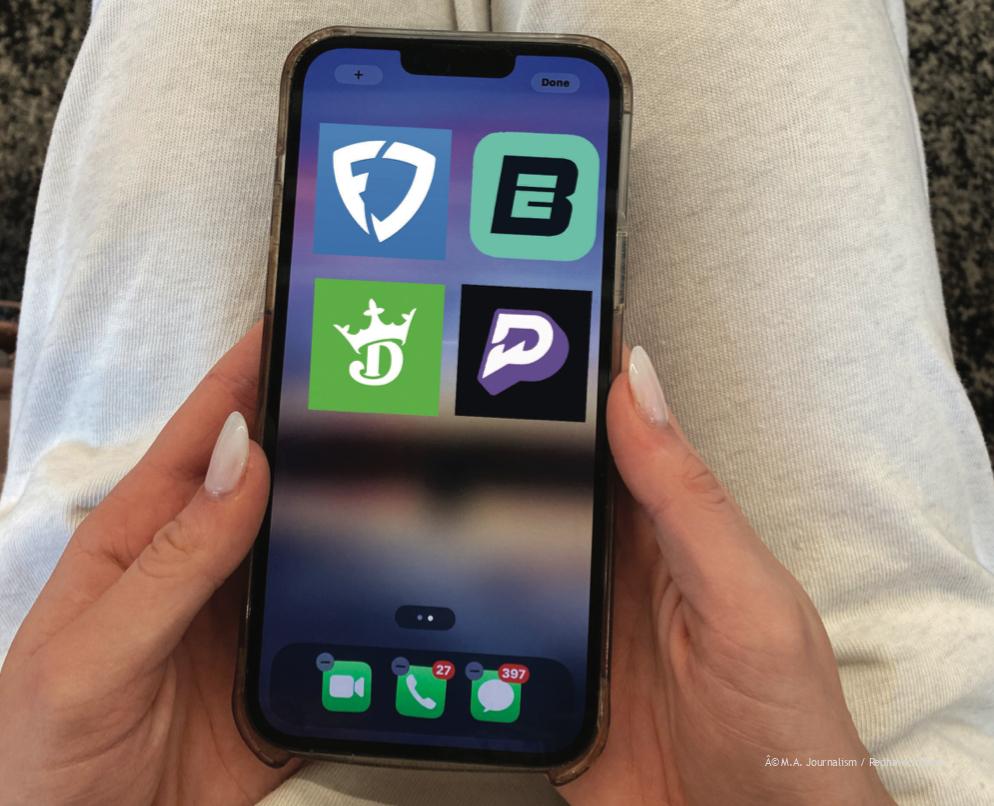The rapidly growing gambling culture continues to infiltrate sports content, so much so that gambling chatter has become a staple of daily sports media.
According to S&P Global, in 2023, a total of $119.84 billion was bet on legal sportsbooks, up 27.5% from the year prior. Financial stability is being left to the fate of sports, and what looks like a dystopian reality from a bird’s-eye view is being pushed by the supposed ethical news networks as a more exciting approach to sports viewing.
“I see the casino ads and the Fanduel ads at least twice every commercial break when I’m watching ESPN,” said third-year Minnehaha student Evan Anderson.
It seems so simple. You watch sports, right? All you have to do is just parlay two picks, maybe throw in a player prop, and you can make hundreds, if not thousands of dollars.
“My entire TikTok page is full of people making parlays,” said an anonymous Minnehaha gambler, “It makes [gambling] feel okay.”
Here’s the reality: the sportsbook always wins. It’s the law of averages; if the odds of a given line are 50/50, the sportsbook will profit, thanks to what is called a “vigorish,” often referred to as a “vig” or “hold.” The vig charges the bettor a commission for the sportsbook’s services — the commissions are built into the lines. A $100 bet with 50/50 odds could have a payout of $190, and the ten missing dollars remain with the sportsbook. On a high enough volume, sportsbooks guarantee success.
Gamblers chase the “big hit,” and the pay-day potential is enticing, but the fantasy of life after winning is more tantalizing than the common reality. According to the Milken Institute, on average, for every dollar that is bet, the bettor loses 7.7 cents. And despite the higher-than-not likelihood of failure, while feigning innocence, the media sells the fictional expectation that gambling is an easy way to make money from your couch.
“Cash in on your sports fandom” is the closing tagline of the latest PrizePicks ad. PrizePicks is a daily fantasy app that allows users to bet on over/unders with real currency and transactions, so it’s no secret that they benefit from making success in gambling appear more attainable than it is.
The CBC (Canadian Broadcasting Corporation) and researchers at the University of Bristol conducted a study to find how frequently viewers are exposed to gambling promotions when watching pro sports — the study looked at five NHL games and two NBA games in Canada. Over the course of the seven games, the study found that on average, 21% of each broadcast featured a gambling message somewhere on the screen, many of the ads being on the playing surface.
“There are media that obviously depend upon advertising, in a general sense, for their survival. But, I think if you look at [betting coverage] in the context of journalism ethics, the question becomes, ‘who are you looking to serve?’” said Jane Kirtley, the Silha Professor of Media Ethics and Law at the Hubbard School of Journalism and Mass Communication at the University of Minnesota.
It should be pointed out that this isn’t the first harmful-in-excess product promoted by the media to strengthen a profitable business’ public image. To this day, alcohol is presented as a lighthearted way to celebrate a good time, and through the 20th century, every “cool” TV character could be seen with a cigarette in hand.
“I think with gambling, we know it can be addictive for some, but not necessarily all. And as long as it’s a legal activity, I think ultimately it’s going to come down to the media outlet to make its own determinations,” Kirtley said.
The news networks require profit from ad revenue to stay afloat, and the sportsbooks offer a hefty sum of cash. But not only do networks air betting commercials, platforms such as ESPN are riddled with gambling-themed shows and betting “experts.”
“If the gambling becomes the primary mover for the programming, then for me, it does cross an ethical line. Because to me, it’s not putting the consumer of news first,” Kirtley said.
Gambling has altered modern sports consumption, whether it be how people watch games, or how people talk about games. Gambling jargon has even become the foundation of analysis; every TV talking head refers to lines or props as a way to evaluate games.
The Supreme Court passed a law allowing for individual states to legalize sports gambling in 2018, and since then, 38 states have already welcomed the change. Country-wide sports gambling is relatively new, so parameters are struggling to keep up with the onslaught in popularity, and as of now, regulations on media are limited.
Unless the industry pivots, sports media is normalizing the money-wounding habit that consumers just can’t escape.

